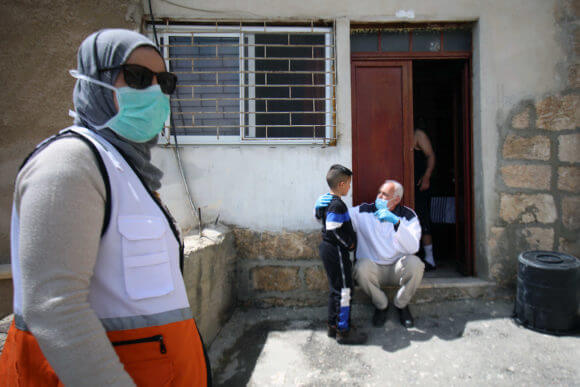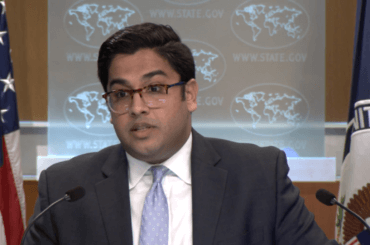This is the latest edition of our special coverage newsletter on the COVID-19 crisis in Palestine featuring dispatches directly from our Palestine correspondent Yumna Patel on the ground in Bethlehem. This newsletter is published Tuesdays and Fridays.
[mailpoet_form id=”5″]
It’s been one month since Bethlehem was shut down due to the coronavirus.
It’s an occasion we were hoping to celebrate with good news in the city, but instead, our quarantine orders were extended for another month, and the amount of confirmed cases in the West Bank has more than doubled since last week.
We now have 261 confirmed cases of the virus, the majority of which have come from Palestinian laborers working in Israel and their family members.
Every day, new stories and rumors emerge in the community about how the virus is being spread: people ignoring their quarantine orders, concealing their illness from authorities, or knowingly interacting with neighbors and family members even though they are sick.
Despite the urging of Palestinian officials, leaders, activists, and everyday people to stay at home, it seems that there remains, to a degree, a lack of education about the virus as well as cultural stigma.
One Palestinian friend told me that some people, particularly in rural areas, are treating the coronavirus with the same stigma that HIV/AIDS carries, and that people are ashamed to have themselves or a member of their families test positive for the virus.
Nevertheless, the government, companies, and grassroots organizations are continuing awareness efforts and advocating for social distancing.
Jawwal, one of the major cellular communications companies in Palestine changed its network name on people’s phones from “Jawwal” to “Stay Home,” and greets users with a similar message before placing any outgoing call.
The Arabic version of #stayathome is trending on Palestinian social media, while parody songs in Arabic about “corona” have racked up hundreds of thousands of views on Youtube.
In Gaza, photos emerged of people dressed up in coronavirus masks wearing signs targeting children, telling them “stay away from me.”
Another video from the besieged territory showed a group of friends holding a small “wedding procession” for their friend ‘Abood’, with traditional Arabic wedding beats blasting away in the background as the group sang “corona, oh corona, oh corona, Aboud will celebrate here tonight.”
The procession, while it did not necessarily adhere to social distancing recommendations, gave many people a much-needed laugh, and was a reminder of Palestinian resilience, and people’s ability to roll with the punches of life.
Throughout all of this, people have continued to support each other in ways that have continued to surprise me.
Italian rooftop and balcony “quarantine parties” have been mimicked across Bethlehem and Ramallah, while young brides and grooms from Gaza and the West Bank have been forgoing parties and gifts, choosing instead to use their wedding budgets on distributing food parcels to families in need in their communities.
In one of the refugee camps in Bethlehem, families of current and former prisoners who receive pensions from the government were reportedly organizing so that they could contribute a portion of their salaries to other people who were struggling.
There’s no doubt that the situation is going to become more difficult in the coming weeks, as what little savings people have begins to run dry. With no government protection for workers or unemployment benefits, community solidarity can only take people so far.
We’ve seen the occupation continue to run its course over the past month, with daily reports of settler attacks on Palestinians and their property, home demolitions, and Israeli night raids.
On Tuesday, Palestinian rights groups reported that in the month of March alone, Israel has arrested 357 Palestinians, including 48 children.
There is growing concern among Palestinian activists and ordinary citizens that, while they are being forced to stay at home, Israel is working harder than ever to steal their land, and enforce President Trump’s Deal of the Century.
On Monday, those fears were confirmed when Prime Minister Benjamin Netanyahu and his rival Benny Gantz agreed to move ahead with plans to annex portions of the West Bank as early as this summer.
This morning, I was chatting with a local activist who told me something that I’ve been hearing a lot of recently: “We are being told to stay at home, and that will protect us. But as long as we are under lockdown, the occupation will continue to steal our land and arrest our people, and there’s not a thing we can do about it.”



https://www.juancole.com/2020/04/occupied-palestine-surviving.html
“Top 7 Lessons from Israeli-Occupied Palestine on Surviving Lockdown” by Ramzy Baroud, April 7, 2020
EXCERPT:
“Call it a ‘quarantine’, a ‘shelter-in-place’, a ‘lockdown’ or a ‘curfew’, we Palestinians have experienced them all, though not at all voluntarily.
“Personally, the first 23 years of my life were lived in virtual ‘lockdown’. My father’s ‘quarantine’ was experienced much earlier, as did his father’s ‘shelter-in-place’ before him. They both died and were buried in Gaza’s cemeteries without ever experiencing true freedom outside of their refugee camp in Gaza.
“Currently in Gaza, the quarantine has a different name. We call it ‘siege’, also known as ‘blockade’.
“In fact, all of Palestine has been in a state of ‘lockdown’ since the late 1940s when Israel became a state and the Palestinian homeland was erased by Zionist colonialists with the support of their Western benefactors.
“That lockdown intensified in 1967 when Israel, now a powerful state with a large army and strong allies, occupied the remaining parts of Palestine – East Jerusalem, the West Bank and the Gaza Strip.
“Under this lockdown, the Palestinian freedom of movement was curtailed to the extent that Palestinians required permits from the Israeli military to leave the Occupied Territories or to return home, to move about from one town to the other, and, at times, to cross a single Israeli military checkpoint or a fortified wall.
“In Palestine, we don’t call our imprisonment a lockdown, but a ‘military occupation’ and ‘apartheid’.
“As for ‘shelter-in-place’, in Palestine, we have a different name for it. We call it a ‘military curfew’.
“Since I was a child, I learned to listen intently to orders barked out by Israeli military officers as they swept through our refugee camp in Gaza declaring or easing military curfews. This ritual often happened late at night.
“’People of Nuseirat, per orders of the Israeli military you are now under curfew. Anyone who violates orders will be shot immediately,’ the terrifying words, always communicated through a loudspeaker in broken Arabic, were a staple during the First Palestinian Uprising (Intifada) of 1987.
“The period between 1987 to 1993 was a virtual ‘lockdown’. Thousands of people, mostly children, were killed for failing to respect the rules of their collective imprisonment.
“In Gaza, even when a full military curfew was not in place, we rarely left our small and crowded neighborhoods, let alone our refugee camps. We were all haunted by the fear that we may not be able to make it home by 8p.m., the time designated by the Israeli military for all of us to return home.
“Every day, ten or fifteen minutes after the nightly curfew set in, we would hear the crackling and hissing of bullets as they whistled through the air from various distances. Automatically, we would conclude that some poor soul – a worker, a teacher, or a rowdy teenager – missed his chance by a few minutes, and paid a price for it.
“Now that nearly half of the population of planet Earth are experiencing some form of ‘curfew’ or another, I would like to share a few suggestions on how to survive the prolonged confinement, the Palestinian way.”
So it sounds like the educated Jews and Arabs , both citizens and living under hamas or PA are keeping relatively safe while the mediocre educated citizens, Jew and non Jew alike are trying to avoid infection to various degrees of success or failure depending on their families, social groups taking government, CDC or WHO warnings seriously and the feckless, probably stubborn ignorant religious radicals, Muslims Jews and a few others are risking the entire nation of Israel, be it ereytz, Zion, Palestine. Israel, Palestine territory, Gaza, golan and more (it’s not stopping on it’s way through Jordan to KSA, Yemen or Israel. Nor is it stopping from china thru wuhan thru Italy and onto the other European nations, matey, just maybe human restraint will lower the death culls from west Asia to southwest USA where 70% of folks weren’t taking: washing, alchohol. Gloves or face masks seriously.
Props to The local recreational weed dispensaries. They all seemed fresh on new info and took extra precautions for safety. Shout out to Trinidad colorado, Santa Fe, Taos, Carmel-by-the-sea. Badass little treasures. Special mention: Cambria ca.
13,890 miles for medical necessity and San Fran, philly and Taos took things seriously. The rest west armature hodgepodge hour,.